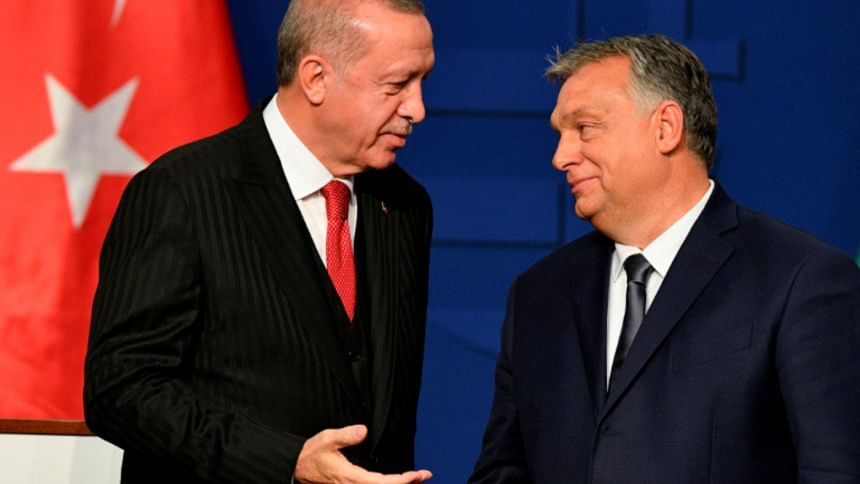ILLIBERAL DEMOCRACIES: The looming oxymoron

As the impeachment trial of US President Donald Trump unfolds in the US Senate, something very strange is going on.
The president and his defenders in the Senate are dismissing all charges, saying there's no evidence. Trump has repeatedly called it a "hoax." According to him, it is, if you will forgive the pun, a trumped-up charge based on a "perfect" phone call in April 2019 to the Ukrainian President Volodymyr Zelensky where he asked for (wink, wink) a favour.
But here's the odd thing.
For a president and his supporters who so vociferously claim his innocence, you'd think they would be the most enthusiastic about getting everything related to the issue out in the open—documents, testimony of people privy to what actually happened, everything. "Sunlight is the best disinfectant," US Judge Learned Hand had once intoned.
Yet right from the get go, the Trump administration has done its darnedest to close off all possible routes to information. It barred administration officials and bureaucrats from testifying during the House investigation, and refused to comply with any request for documentation.
I think it's a safe bet that you aren't the only one who finds it very strange behaviour from people who profess the stoutest faith in the president's innocence. After all, if somebody is innocent, all possible evidence should be exculpatory, right?
My intention, however, is not to provide a thumbnail sketch of the current US impeachment saga, which is being covered ad nauseum by every known media.
I'm simply bringing up the impeachment to make a broader point.
Democracy has always been messy, but we seem to have entered a new age of intolerance and autocracy which is happy to sheathe itself in the accoutrements of democracy, for which it has scant respect.
It's the attitude of those in power that is so disturbing. It's the increasing currency of politics as a brand of virulent tribalism. It's the notion that political opponents are not just opponents with disagreements, but undeserving of the right to dissent at all. It's a situation where political divisions are not driven by ideological or political disagreements over which there is the possibility of a give-and-take and compromise, but manifested in purely subjective, implacably opposed, different groups.
Add to this a brazen shamelessness, a remarkable willingness to flat-out lie in the face of contradictory facts, made all the more possible due to the tribal nature of politics. When you've got on that slippery slope, the next thing you know is you're trying to pack the courts, twist the arms of universities, and play fast and loose with the media to erase the last vestiges of a level playing field for the marketplace of ideas.
The likes of President Recep Tayyip Erdogan of Turkey, Prime Minister Victor Orban in Hungary, and the ruling Law and Justice Party of Poland epitomise this intolerance. While their democratic credentials are genuine, their commitment to democratic values is deeply suspect.
It's heart-breaking to note that this deadly virus has deeply affected the Indian subcontinent. In Bangladesh, the signs are too many to belabour repetition: Ballot boxes get captured in uncontested elections; people disappear with disquieting frequency; dissenters are viciously beaten up. In India, vigilante teams attack Muslims and broadcast it live on social media. Attacks on secular writers and activists have gotten so bad there—a few have been murdered in the recent past—that many authors have returned national literary awards.
The notion that democracy is too dangerous for a country's own good is one much favoured by autocrats. It had once landed now-deceased Singapore President Lee Yuan Kew in hot water in international circles. Kew, the architect of modern Singapore, is credited with the astonishing economic success of that nation state.
Always a bare-knuckled pugilist of a politician, he never minced words. He said flatly that the improvement of the quality of life of citizens was too important a task to be left to the fickle vagaries of democracy. Singapore is effectively a dictatorship with some affectations of democracy—regular elections (where the playing field is ludicrously uneven), an unfree press (The Strait Times, the major English-language daily, is state-owned).
Kew had a point, but it's as spurious as justifying a rape just because it produced an Einstein. The real danger of choosing economic progress over democracy is that you might end up with neither.
For the health and sustenance of democracy, political rivalry should not manifest in thuggery and intimidation. It should—and can, with great effect—be played out in the realm of words. History tells us that in 19th century Britain, there was no love lost between British Tory statesman Benjamin Disraeli and his bitter rival, Liberal statesman William Gladstone. Both served terms as prime minister. Disraeli had said that Gladstone had "not one redeeming defect." Radical Liberal statesman John Bright, on the other hand, had said that Disraeli is a "self-made man who worships his creator."
When Disraeli was asked the difference between a misfortune and a calamity, he had deadpanned: "If Gladstone fell into the Thames, that would be a misfortune; and if anybody pulled him out, that, I suppose, would be a calamity."
Alas, in today's intolerant age, it's more likely that someone would actually physically throw Gladstone into the Thames, and prevent all attempts to pull him out.
Ashfaque Swapan is a contributing editor for Siliconeer, a digital daily for South Asians in the United States.

 For all latest news, follow The Daily Star's Google News channel.
For all latest news, follow The Daily Star's Google News channel. 



Comments